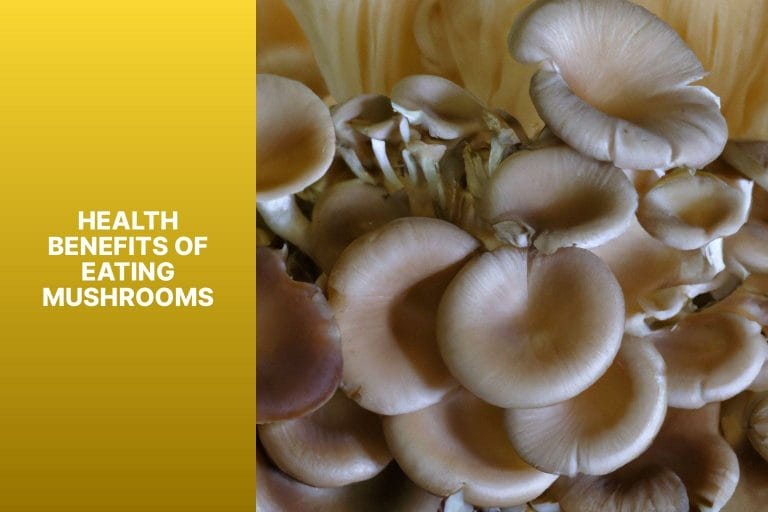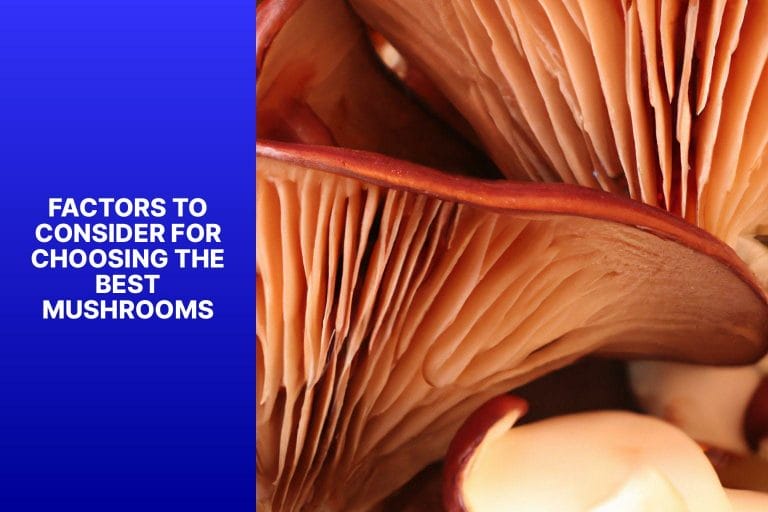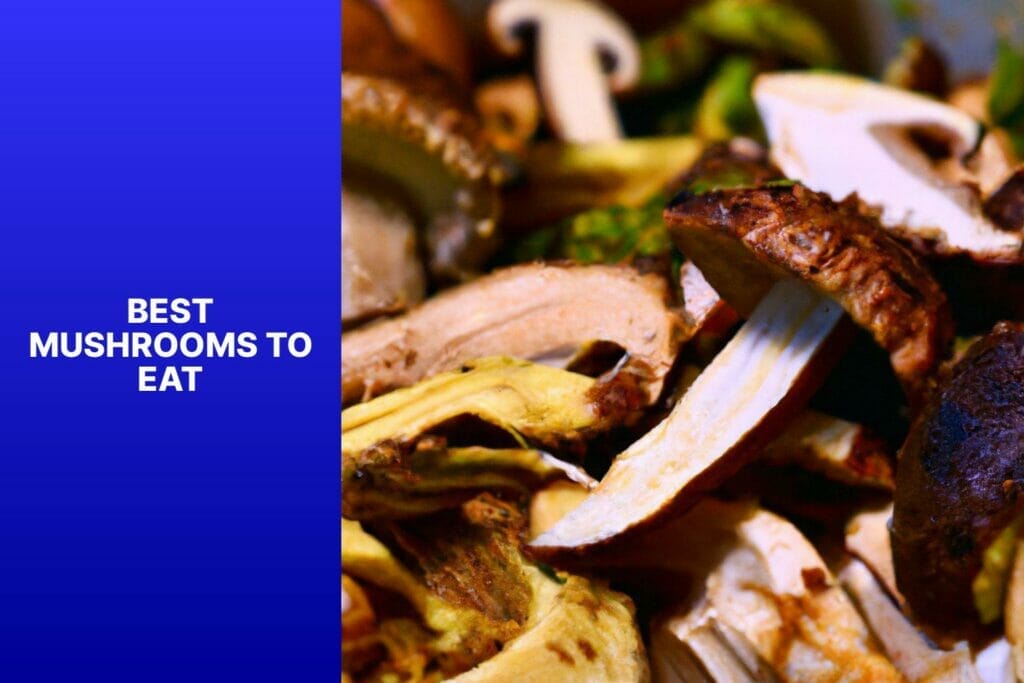Mushrooms are not only delicious but also packed with numerous health benefits. Whether you are a seasoned mushroom lover or looking to incorporate them into your diet, understanding the best mushrooms to eat can enhance your culinary experience and provide a range of health advantages.
By referencing reputable sources such as the American Society for Nutrition, we highlight the health benefits of eating mushrooms, including their nutritional value, immune-boosting properties, potential heart health benefits, anti-cancer properties, and their positive effects on brain function, weight management, and blood sugar levels.
Several factors should be considered when considering which mushrooms to include. These factors include taste and texture, culinary versatility, availability, accessibility, and the nutritional profile of the mushrooms.
To assist you in making informed choices, we outline the top five mushrooms that are not only delicious but also offer numerous nutritional benefits. These are Portobello mushrooms, Shiitake mushrooms, Maitake mushrooms, Oyster mushrooms, and White Button mushrooms.
We suggest incorporating mushrooms into your meals to maximize their flavors and nutritional benefits. From sautéing and grilling to incorporating them into stir-fries, soups, and salads, mushrooms can be enjoyed in various ways.
You can make the most of these versatile and nutritious fungi by considering the health benefits and key factors for choosing mushrooms and incorporating them into your meals.
Key takeaway:
- Health benefits of mushrooms: Mushrooms offer numerous health benefits, including boosting the immune system, supporting heart health, having anti-cancer properties, enhancing brain function, and managing weight and blood sugar levels.
- Factors to consider when choosing mushrooms: When selecting mushrooms for consumption, it is important to consider factors such as taste and texture, culinary versatility, availability and accessibility, and nutritional profile.
- Top 5 mushrooms to include in your diet: Portobello mushrooms, shiitake mushrooms, maitake mushrooms, oyster mushrooms, and white button mushrooms are among the best mushrooms to incorporate into your diet due to their flavor, nutritional value, and culinary adaptability.
Health Benefits of Eating Mushrooms

Photo Credits: True2Mushrooms.Com by Walter Hall
Discover the incredible health benefits of incorporating mushrooms into your diet! From enhancing brain function to supporting heart health, mushrooms pack a powerful nutritional punch.
Uncover valuable information on the nutritional value of mushrooms and how they can boost your immune system. Learn about their potential anti-cancer properties and how they can help manage weight and blood sugar levels. Prepare to be amazed by the wide-ranging advantages of these fungi!
Nutritional Value of Mushrooms
Mushrooms have diverse nutritional value, making them a great addition to any diet. They are low in calories and fat, making them a healthy choice for weight management. They also provide essential amino acids needed for building and repairing tissues, making them a good source of protein.
Mushrooms are rich in vitamins and minerals, particularly B vitamins like riboflavin, niacin, and pantothenic acid, which are crucial for energy production and maintaining a healthy nervous system. They also contain minerals such as selenium, copper, and potassium, which are important for various bodily functions.
| Nutrient | Amount per 100g |
| Protein | 3.1g |
| Carbohydrates | 3.3g |
| Fiber | 1g |
| Fat | 0.4g |
| Vitamin B2 (Riboflavin) | 0.4mg |
| Vitamin B3 (Niacin) | 3.7mg |
| Vitamin B5 (Pantothenic acid) | 1.5mg |
| Selenium | 22.5mcg |
| Copper | 0.3mg |
| Potassium | 318mg |
The nutritional value of mushrooms may vary slightly depending on the specific type. All mushrooms offer a range of health benefits and can be a valuable addition to a balanced diet.
Fun Fact: Did you know that mushrooms are one of the few natural sources of vitamin D? Exposure to sunlight causes mushrooms to produce vitamin D, making them a unique dietary source of this essential nutrient.
Boosting the Immune System
Mushrooms can boost the immune system due to their unique properties and composition.
1. Beta-glucans: Shiitake, maitake, and reishi mushrooms contain beta-glucans, natural polysaccharides that enhance immune function. These compounds stimulate immune cells, improving their activity and promoting a healthy immune response.
2. Antioxidants: Mushrooms are rich in antioxidants like selenium and vitamins C and D, which protect against oxidative stress and reduce inflammation. By reducing oxidative stress, mushrooms support the immune system’s optimal function.
3. Antiviral and antibacterial properties: Reishi and Chaga mushrooms possess antiviral and antibacterial properties that strengthen the immune system by fighting pathogens and reducing the risk of infections.
4. Adaptogenic effects: Reishi and cordyceps mushrooms have adaptogenic properties that help the body respond to stress. These mushrooms indirectly support the immune system by reducing stress, as chronic stress weakens immune function.
5. Gut health: Mushrooms like lion’s mane and turkey tail contain prebiotic fibers that promote the growth of beneficial gut bacteria. A healthy gut microbiota contributes to a stronger immune system.
Pro tip: Include a variety of mushrooms in your diet to reap immune-boosting benefits. Try shiitake mushrooms in stir-fries, sliced portobellos in burgers, or oyster mushrooms in pasta dishes. Enjoying a diverse range of mushrooms can diversify nutrient intake and support optimal immune function.
Supporting Heart Health
Consuming mushrooms can significantly support heart health due to their unique nutritional composition and beneficial properties. Mushrooms are an excellent choice for heart-healthy food as they are low in calories, fat, and cholesterol.
Their high dietary fiber content helps reduce cholesterol levels and minimize the risk of heart disease. Mushrooms contain essential compounds such as beta-glucans and antioxidants, effectively enhancing cardiovascular health.
An additional advantage of mushrooms is their rich potassium content, which is vital in maintaining heart health. Potassium helps regulate blood pressure, counteracts the negative effects of sodium, and promotes the relaxation of blood vessels.
By including mushrooms in your diet, you can prevent the development of conditions like high blood pressure, heart attacks, and strokes.
To promote and support heart health, incorporate mushrooms into your meals by adding them to dishes such as salads, stir-fries, soups, and omelets.
Optimal varieties include Portobello mushrooms, shiitake, maitake, oyster, and white button mushrooms.
When selecting mushrooms, consider factors such as taste, texture, availability, and nutritional profile to maximize the heart-healthy benefits they provide.
Anti-cancer Properties
Mushrooms have exceptional anti-cancer properties, making them significant for a cancer-preventive diet. The distinctive compounds in mushrooms effectively inhibit tumor growth and decrease the risk of specific types of cancer.
One of these compounds, ergothioneine, can be found in mushrooms in significant amounts. Ergothioneine acts as a potent antioxidant, safeguarding cells against damage caused by free radicals and oxidative stress, which can contribute to cancer development.
Mushrooms contain beta-glucans, which enhance the immune system and stimulate the production of cells that fight against cancer. Numerous studies have demonstrated the potential anti-cancer effects of mushrooms such as shiitake, maitake, and reishi.
These mushrooms possess anti-tumor, immune-boosting, and anti-inflammatory properties and can even regulate genes that play a role in cancer progression.
To fully benefit from the range of anti-cancer advantages, it is crucial to consume fresh mushrooms instead of relying on supplements or processed products.
Including a variety of mushrooms in your meals is highly recommended. It is important to seek personalized advice and guidance from a healthcare professional when incorporating mushrooms into a cancer-preventive diet.
Enhancing Brain Function
Eating mushrooms can naturally enhance brain function by providing various health benefits. Mushrooms are packed with antioxidants like selenium and vitamin C, which safeguard the brain from oxidative stress and reduce the chance of cognitive decline.
Certain mushrooms, such as lion’s mane, stimulate the production of nerve growth factors in the brain, resulting in improved brain function, memory, and cognitive abilities.
Mushrooms contain anti-inflammatory compounds, aiding in reducing brain inflammation and promoting better cognitive function.
Mushrooms, including portobello mushrooms, serve as an excellent source of choline, an essential nutrient for brain health that plays a role in neurotransmitter production.
Mushrooms contain beta-glucans, which possess immune-enhancing properties crucial for overall brain health and function. To incorporate a variety of mushrooms into your diet and boost brain function, consider adding lion’s mane mushrooms to stir-fries or soups, enjoying portobello mushrooms as a meat replacement in burgers, or including shiitake mushrooms in your favorite Asian-inspired dishes.
Remember to handle mushrooms safely and cook them thoroughly to avoid potential risks. By including mushrooms in your diet, you can naturally enhance brain function.
Managing Weight and Blood Sugar Levels
Managing weight and blood sugar levels is crucial for maintaining a healthy lifestyle. Incorporating mushrooms into your diet can be beneficial in achieving these goals. Here are several ways mushrooms can assist:
- Low calories: Mushrooms are a great choice for weight management as they have minimal calories. They can also be used as a substitute for higher-calorie ingredients.
- High fiber: Including mushrooms in your meals provides dietary fiber, aiding digestion and keeping you satiated for longer periods. Fiber is key in maintaining a healthy weight and managing blood sugar levels.
- Low glycemic index: Mushrooms have a low glycemic index, meaning they have a minimal impact on blood sugar levels. This characteristic is advantageous for individuals with diabetes or seeking blood sugar control.
- Nutrient-rich: Despite being low in calories, mushrooms contain essential nutrients such as vitamins, minerals, and antioxidants. These nutrients contribute to overall health and well-being.
- Satiety and portion control: The texture and flavor of mushrooms add volume to meals, making you feel satisfied and reducing the risk of overeating. This can aid in weight management by promoting portion control.
You can enjoy their nutritional benefits by incorporating mushrooms into your diet while managing your weight and blood sugar levels effectively.
Factors to Consider for Choosing the Best Mushrooms

Photo Credits: True2Mushrooms.Com by Tyler Adams
Several factors must be considered when choosing the best mushrooms for our meals. We want mushrooms that not only tantalize our taste buds but also offer a range of culinary possibilities.
Accessibility and availability are crucial in easily finding our desired mushrooms. And, of course, let’s not forget the nutritional aspect – the perfect mushrooms should provide us with the necessary nutrients.
Join me as we delve into the world of mushrooms, exploring the factors that influence our choices.
Taste and Texture
When selecting mushrooms, it’s important to consider both taste and texture. The mushrooms’ flavor can range from mild and earthy to rich and savory. For example, portobellos taste meaty, while white button mushrooms have a delicate flavor.
The texture is another factor to keep in mind. Shiitake mushrooms, for instance, have a firm and chewy texture, which makes them perfect for stir-fries and soups. On the other hand, oyster mushrooms have a tender and delicate texture that works well in sautés and salads.
It’s essential to think about how the taste and texture of mushrooms will complement other ingredients. Portobello mushrooms’ earthiness pairs nicely with grilled meats, while oyster mushrooms’ delicate flavor and tender texture enhance pasta dishes.
Ultimately, your preferences play a significant role in choosing the best mushrooms. Feel free to experiment with different varieties to find your favorites.
Pro-tip: To avoid a mushy texture, avoid overcooking mushrooms. Cook them until tender while still maintaining their shape and texture.
Culinary Versatility
The culinary versatility of mushrooms allows them to be used in a wide range of dishes. Different types of mushrooms offer distinct flavors, textures, and cooking properties, making them suitable for various recipes.
Here is a table showcasing the culinary versatility of different mushrooms:
| Mushroom | Flavor | Texture | Cooking Methods |
| Portobello | Meaty, earthy | Firm, chewy | Grilling, roasting, stuffing |
| Shiitake | Rich, smoky | Chewy, slightly crunchy | Stir-frying, sautéing, soups |
| Maitake | Savory, nutty | Tender, slightly crisp | Stir-frying, sautéing, grilling |
| Oyster | Mild, delicate | Soft, Velvety | Stir-frying, sautéing, soups, pasta |
| White Button | Mild, slightly earthy | Crisp, firm | Sautéing, roasting, salads |
These are just a few examples of mushrooms with diverse culinary uses. The flavors and textures of mushrooms can enhance various dishes, including stir-fries, soups, risottos, salads, and sauces.
With their culinary versatility, mushrooms provide an excellent opportunity to experiment with different flavors and cooking methods in your culinary creations.
Availability and Accessibility
When considering mushrooms for your diet, it is important to consider availability and accessibility. Here are some factors to keep in mind:
– Local Availability: It is recommended to choose mushrooms that are locally grown and readily available in your area. This not only ensures freshness but also supports local farmers.
– Seasonal Availability: Certain mushroom varieties may be easier to find during specific seasons. The seasonal availability guarantees you enjoy them at their freshest and most flavorful.
– Supermarket Accessibility: It is advisable to check the availability of different mushroom varieties in your local supermarkets. Common white button mushrooms and portobello mushrooms are usually widely accessible.
– Farmers’ Markets: Exploring local farmers’ markets provides a wider range of mushrooms, including unique and exotic varieties. These markets often have freshly harvested mushrooms not commonly found in supermarkets.
– Online Availability: It is worth considering online suppliers if you are searching for specific mushroom varieties not easily found in your area. Online platforms generally offer a wide selection of mushrooms that can be conveniently delivered to your doorstep.
Fact: It is essential to consume mushrooms within a few days of purchase to maintain their quality and flavor, as they are highly perishable.
Nutritional Profile
The nutritional profile of mushrooms can vary but are generally low in calories and fat while rich in essential nutrients. Here is a table highlighting key nutrients found in popular mushroom varieties:
| Mushroom Variety | Calories per 100g | Protein per 100g | Carbohydrates per 100g | Fiber per 100g | Vitamin D per 100g | Iron per 100g |
| Portobello Mushrooms | 22 | 3 g | 3 g | 1 g | 0 IU | 0.5 mg |
| Shiitake Mushrooms | 34 | 2.2 g | 6.8 g | 2.5 g | 0 IU | 0.5 mg |
| Maitake Mushrooms | 31 | 1.2 g | 7.1 g | 2 g | 0 IU | 0.7 mg |
| Oyster Mushrooms | 33 | 3.3 g | 6.1 g | 0.9 g | 0 IU | 0.3 mg |
| White Button Mushrooms | 22 | 3.1 g | 3.3 g | 1 g | 0 IU | 0.5 mg |
Mushrooms have a favorable nutritional profile, low in calories and carbohydrates, making them an excellent option for those watching their calorie intake or following a low-carb diet. They are also a good source of protein and dietary fiber, which can help with feeling full and digestion.
While mushrooms are not a significant source of vitamin D unless exposed to sunlight or UV light, they provide important minerals like Iron. Mushrooms contain vitamins such as B and C and antioxidants supporting overall health.
When incorporating mushrooms into your diet, consider their nutritional profile and other factors such as taste, texture, culinary versatility, and availability. Including various mushrooms in your meals can contribute to a well-rounded and nutritious diet.
Top 5 Mushrooms to Include in Your Diet
Are you looking to add some delicious and nutritious mushrooms to your diet? Look no further! This section explores the top 5 mushrooms you should consider incorporating into your meals.
We’ve covered you, from the meaty and versatile Portobello mushrooms to the earthy and flavorful Shiitake mushrooms. Get ready to discover the wonders of Maitake, Oyster, and White Button mushrooms as we uncover their unique characteristics and benefits to your overall well-being.
Portobello Mushrooms
Portobello mushrooms, also known as Portobello mushrooms, are a popular and versatile variety that can be a delicious addition to your diet. Here is a table with key information about Portobello mushrooms:
| NUTRITIONAL VALUE |
|---|
| Calories per 100 grams: 22 |
| Protein per 100 grams: 3.1 grams |
| Fat per 100 grams: 0.4 grams |
| Carbohydrates per 100 grams: 3.9 grams |
| Fiber per 100 grams: 1 gram |
| Calcium per 100 grams: 3% |
| Potassium per 100 grams: 9% |
| Vitamin C per 100 grams: 0% |
Portobello mushrooms provide a low-calorie option for weight management and a good source of protein and fiber. They are also rich in potassium, which supports healthy blood pressure levels. Although not high in vitamin C, they offer other nutritional benefits.
When cooked, Portobello mushrooms have a hearty and meaty texture, making them a great meat substitute in vegetarian or vegan dishes. You can grill, roast, stuff, or use them as burger patties. Their large size allows for various fillings and toppings, adding flavor to your meals.
Portobello mushrooms are easily available in most grocery stores and can be used in various recipes. Whether you want to enhance the taste and texture of your dishes or enjoy their nutritional benefits, Portobello mushrooms are a versatile and healthy choice to include in your diet.
Shiitake Mushrooms
Shiitake mushrooms have a rich, earthy flavor and a meaty texture. They add depth to dishes and are versatile in different cuisines. They can be used in stir-fries, soups, stews, and vegan meat substitutes.
Shiitake mushrooms are widely available in grocery stores and farmer’s markets. They can be purchased fresh, dried, or as extract and supplements.
Shiitake mushrooms are low in calories and fat. They are a good source of dietary fiber, vitamins (B vitamins, vitamin D), and minerals (Iron, zinc, magnesium). They also contain antioxidants and polysaccharides that contribute to their health benefits.
They are known for boosting the immune system, enhancing brain function, and supporting heart health. They also have anti-cancer properties and can help manage weight and blood sugar levels. Incorporating shiitake mushrooms into your diet can promote overall well-being.
When using shiitake mushrooms in your meals, cook them thoroughly to maximize their flavor and nutritional benefits. For a delicious and nutritious meal, please include them in stir-fries, soups, or sauté with other vegetables.
Including shiitake mushrooms in your diet is a flavorful and healthy choice. Their unique taste, versatility, and numerous health benefits make them an excellent addition to any culinary repertoire.
Maitake Mushrooms
Maitake mushrooms, also known as “hen of the woods,” have gained popularity recently due to their various health benefits. These mushrooms offer a range of nutrients and can be incorporated into your diet in various ways.
Here is the nutritional information for Maitake mushrooms per 100g serving: They contain only 31 calories, 7g of carbohydrates, 2g of protein, and absolutely no fat. They provide 2g of fiber, making them a great choice for those looking to increase their fiber intake.
Maitake mushrooms also contain important vitamins and minerals such as Vitamin D, providing 0mcg per serving; calcium, offering 2% of the daily recommended intake; and Iron, providing 3%.
They are also a good source of potassium, supplying 9% of the daily recommended intake.
Incorporating Maitake mushrooms into your meals can have numerous health benefits. Maitake mushrooms contain beta-glucans that have been shown to stimulate and enhance immune function.
Including these mushrooms in your diet can boost your immune system, helping fight infections and illnesses.
Maitake mushrooms are beneficial for supporting heart health. These mushrooms are low in calories, making them a wise choice for those watching their weight.
They are also fat-free and offer a good amount of potassium. Incorporating Maitake mushrooms into your meals can potentially help lower blood pressure and reduce the risk of cardiovascular diseases.
Research has also suggested that Maitake mushrooms possess anti-cancer properties. They have been found to inhibit the growth of cancer cells and reduce inflammation in the body.
By including Maitake mushrooms in your diet, you can potentially reduce the risk of developing certain types of cancer.
Maitake mushrooms are believed to enhance brain function. They are rich in antioxidants, which protect brain cells from oxidative stress, promoting better cognitive function. Including Maitake mushrooms in your meals can contribute to overall brain health.
Maitake mushrooms can be beneficial for managing weight and regulating blood sugar levels. These mushrooms can help with weight management and blood sugar control with their low-calorie and high-fiber content.
To incorporate Maitake mushrooms into your meals, consider adding them to stir-fries, soups, or salads. Their unique texture and earthy flavor make them a versatile and healthy addition to any dish.
Enjoy the nutritious benefits of Maitake mushrooms while also savoring their delicious taste.
Oyster Mushrooms
Oyster mushrooms are nutritious and versatile, suitable for a variety of dishes. Consider the following key points about Oyster mushrooms:
– Nutritional value: Oyster mushrooms, also known as oyster mushrooms, are rich in vitamins and minerals, including vitamin B, potassium, and Iron. They are also low in calories and dietary fiber, making them a healthy choice.
– Culinary versatility: Oyster mushrooms have a mild flavor and tender texture, making them suitable for various culinary preparations. They can be used in stir-fries, soups, salads, pasta dishes, and as a meat substitute in vegetarian or vegan recipes.
– Availability and accessibility: Oyster mushrooms are readily available in grocery stores and farmers’ markets. They can also be grown at home using a mushroom growing kit or by cultivating them on a substrate like straw or sawdust.
– Preparation: Before cooking oyster mushrooms, gently remove any dirt or debris. They can be cooked whole or sliced and cooked within 5-10 minutes.
– Flavor pairing: Oyster mushrooms have a delicate flavor that pairs well with herbs like thyme or rosemary, garlic, onions, and other vegetables to enhance their taste in a dish.
Whether you’re an experienced mushroom lover or new to incorporating mushrooms into your diet, Oyster mushrooms are a great option due to their nutritional value, culinary versatility, and availability.
White Button Mushrooms
White button mushrooms, also known as white button mushrooms, offer a mild flavor and firm texture, making them an incredibly versatile ingredient in various culinary creations.
These delectable fungi are delicious and incredibly low in calories, containing only about 20 per 100 grams. They are packed with essential vitamins and minerals, including vitamins B3, B5, and B6, as well as potassium, phosphorus, and selenium.
One of the many fantastic aspects of white button mushrooms is their widespread availability and accessibility. Whether you prefer to enjoy them in their natural raw state, sliced and tossed into refreshing salads, or sautéed alongside an array of other delectable vegetables, these mushrooms are sure to please.
They make an excellent topping on mouthwatering pizzas and juicy, flavorful burgers.
When selecting mushrooms for your next culinary endeavor, it is important to consider factors such as taste, texture, versatility, and nutritional value.
By incorporating white button mushrooms into your meals, you can effortlessly elevate the overall flavor profile while ensuring a nutritious dining experience.
How to Incorporate Mushrooms into Your Meals
Looking to incorporate mushrooms into your meals? Here’s how:
- Clean the mushrooms: Gently wipe them with a damp cloth or paper towel to remove dirt and debris.
- Choose the right type of mushroom: Different varieties offer different flavors and textures. Consider cremini, portobello, or shiitake mushrooms for a meaty texture and earthy flavor.
- Slice or chop the mushrooms: Thinly slice for sauces and stir-fries, or chop into smaller pieces for soups and stews.
- Sauté the mushrooms: Heat a pan with olive oil or butter, then cook them over medium heat until they brown and become tender, typically around 5-7 minutes.
- Add mushrooms to dishes: Enhance the flavor and add a meaty texture by including mushrooms in pasta, risotto, omelets, salads, and pizzas.
- Create mushroom-based sauces or gravies: Blend or puree cooked mushrooms with vegetable broth or cream to make a delicious sauce.
- Stuff mushrooms: Remove the stems from portobello mushrooms and fill the caps with a mixture of breadcrumbs, cheese, herbs, and other desired ingredients. Bake them in the oven until golden and crispy.
- Experiment with flavors: Enhance the taste of mushrooms by pairing them with herbs, spices, and seasonings like garlic, thyme, rosemary, or soy sauce.
- Try mushroom-based alternatives: Use mushrooms as a meat substitute in dishes such as mushroom burgers or “bacon.” These alternatives are perfect for vegetarians or those seeking to reduce meat consumption.
- Enjoy your mushroom-filled meals: Incorporating mushrooms into your cooking adds depth of flavor and a range of textures and boosts the nutritional value of your dishes. Get creative and explore different ways to use mushrooms!
Some Facts About the Best Mushrooms to Eat:
- ✅ Button and Portobello mushrooms are rich in B vitamins, selenium, and conjugated linoleic acid, which have cancer-fighting potential. (Source: grocycle.com)
- ✅ Porcini mushrooms are nutrient-dense and contain beta-carotene and lycopene for eye health and heart protection. (Source: grocycle.com)
- ✅ Oyster mushrooms are easy to grow and can boost the immune system, reducing the severity of viruses. (Source: grocycle.com)
- ✅ Chanterelle mushrooms are rich in Vitamin D, essential for overall health, and can prevent fatigue, frequent illness, and depression. (Source: grocycle.com)
- ✅ Maitake mushrooms are adaptogens that help the body adapt to stress and stabilize cortisol levels. (Source: grocycle.com)


